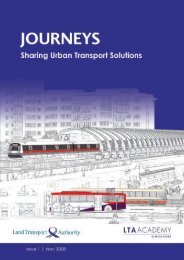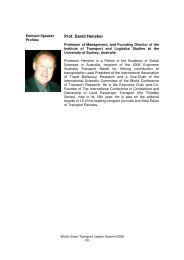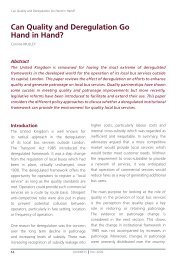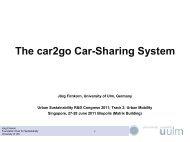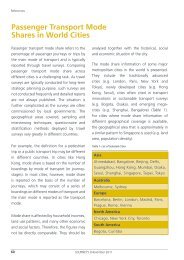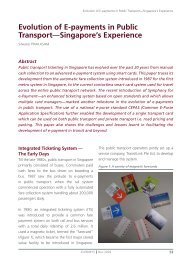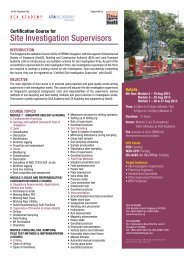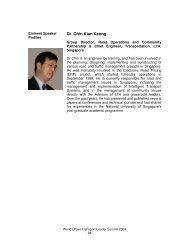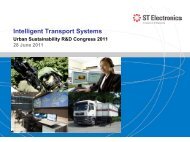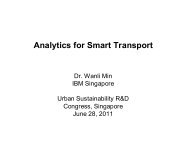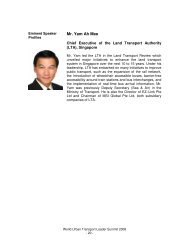Full Version - Issue 7 | November 2011 - LTA Academy
Full Version - Issue 7 | November 2011 - LTA Academy
Full Version - Issue 7 | November 2011 - LTA Academy
Create successful ePaper yourself
Turn your PDF publications into a flip-book with our unique Google optimized e-Paper software.
There was broad consensus among<br />
WPPEET participants that transit-oriented<br />
development, integrated land-use planning,<br />
and minimised private motorised transport<br />
should be among every economy’s primary<br />
development goals.<br />
The “Avoid-Shift-Improve” framework<br />
used by the Asian Development Bank provides<br />
a succinct lens for evaluating transport policy:<br />
Comprehensive transportation policy aims<br />
simultaneously to avoid travel, encourage<br />
a shift from motorised to non-motorised<br />
and low-carbon transport, and improve the<br />
efficiency of existing systems and vehicles.<br />
The WPPEET participants recommended the<br />
introduction of this framework into further<br />
discussions of APEC activities related to<br />
efficient transportation policy.<br />
Recommendations<br />
The recommendations emerging from the<br />
presentations and discussions at WPPEET fell<br />
into three categories:<br />
Recommendations for APEC<br />
Economies: Overcoming Barriers<br />
M a n y e c o n o m i e s f a c e c h a l l e n g e s<br />
integrating transportation policies with<br />
Table 1: Policies to encourage vehicle and transport system efficiency<br />
Recommendations for Improving Transportation Energy Efficiency in APEC Economies<br />
energy and planning p o l i c i e s . The<br />
WPPEET experts suggested measures for<br />
overcoming institutional barriers and the lack<br />
of reliable and comprehensive information,<br />
and for ensuring effective education of<br />
policy-makers and the public.<br />
Recommendations for Economies:<br />
Best Practices in Transport Policy<br />
The workshop recommendations also<br />
included specific policies for APEC economies<br />
to consider in addressing transportation<br />
energy efficiency. The policies are divided<br />
into strategies for improving the energy<br />
efficiency of vehicles, and strategies for<br />
promoting energy efficiency in the entire<br />
transport system (Table1).<br />
A Role for APEC<br />
APEC has an important role in supporting<br />
needed research into key areas related to<br />
energy efficiency in transportation, and<br />
acting as a clearinghouse of information on<br />
these issues. WPPEET workshop participants<br />
specifically recommended two measures;<br />
firstly, studies to improve and fill gaps in<br />
information, and secondly, the creation of a<br />
forum on energy-efficient transportation.<br />
Policies to Encourage Vehicle Efficiency Policies to Encourage Transport<br />
System Efficiency<br />
• Increasing Fuel Economy of New Vehicles • Reducing Road Congestion<br />
• Improving Operational Efficiency • Land Use and Urban Planning<br />
• Energy Efficiency in Freight • Mass Transit<br />
JOURNEYS | <strong>November</strong> <strong>2011</strong><br />
43



